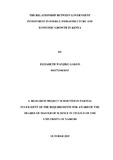| dc.description.abstract | Energy Infrastructure investment is one of the main preconditions for enabling developing countries to accelerate or sustain the pace of their development and achieve the Millennium Development Goals. Although nature has endowed Kenya with an array of energy resources such as wind, coal, water, oil, wood and solar, a large number of these resources have remained unexploited for decades. The inadequate rate of public investment in the past 30 years has resulted in the deficiency and obsolescence of infrastructure in Kenya. To the best of the researcher’s understanding, none of these studies has focused on the effect of government investment in energy infrastructure on economic growth in Kenya. The purpose of this study is to establish the effects of government investment in energy infrastructure on economic growth in Kenya. A descriptive research design was applied in this study. In this study emphasis was given to secondary data which was obtained from the Government development in energy infrastructure obtained from the Kenya National Bureau of Statistics. Quantitative analysis was used through descriptive statistics. In order to test the relationship between the variables the inferential tests including the regression analysis was used to determine the effect of government investment in energy infrastructure on economic growth. The study found that the four variables contribute to 67.3% of economic growth and that a unit increase in government investment in energy infrastructure lead to a 0.137 increase in economic growth. The conclusion is that government investment in energy infrastructure development had a positive and significant affect economic growth in Kenya for the period of this study. The study recommends that adequate funding should be directed towards energy infrastructure projects preparation, implementation and maintenance. The study also recommend expanding and diversifying existing modern energy use and creating sufficient awareness and supplying better technologies at affordable prices so as to sustain the economic growth with better living standards. The study further recommends the energy sector to have an independent and autonomous research center or institution that appropriately design and implement research works in relation to energy, growth, and the environment. | en_US |



